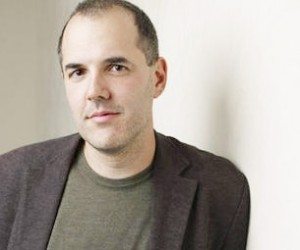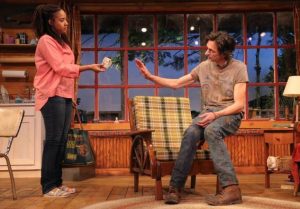

Playwright David Auburn, known widely for Proof and The Columnist, is a Pulitzer and Tony award winner. His latest play, Lost Lake, explores the tenuous relationship between two strangers, Veronica and Hogan, who are both experiencing personal crises. The show, which opened November 11th, continues his collaboration with Manhattan Theatre Club and director Daniel Sullivan. Auburn graciously took a moment to discuss the origins of his latest work, and by doing so, shined a light on his own writing process.
Congratulations on opening Lost Lake! This play strikes me as a bit different than some of your other work. How did Lost Lake come to light?
Thank you. I really think it is much different than my other plays. I really just started with the idea of a negotiation, which is the first scene of the play. That was the initial idea - to have a negotiation between two people who were very different, who have virtually nothing in common and to see what gets teased out of that negotiation as they try to feel each other out. The play just sort of unfolded from there. I wrote it about a year and half ago and it came fairly quickly and in a very organic way.
How do you develop a play and its characters? Do you rewrite often?
It went through a couple of big drafts. We had a reading at the Eugene O’Neill Center. Then we did a workshop with Dan Sullivan at the University of Illinois over the winter. By the time we finished that, the play was substantially what is at MTC. You know, all the major pieces were there from the beginning. What changed were a lot of the nuances of character detail as I tried to dig deeper into each of these two people as it went along. Also, it took me a while to figure out Vernonica’s background story, in terms of what happened with her husband, what her family story was and how much of that to reveal. I guess it wasn’t so much figuring out what it was, but figuring out how someone who is so reluctant to share anything with Logan, would eventually reveal herself to him.
It’s a two hander, and as far as I know, you haven’t written one of those, how is that different than your former writing?
They’re tricky. I didn’t set out to write a two-hander per se. At different points, I thought other characters would come into it. At one point, I think I even did have another character in it. Ultimately, I like the purity of just two characters and I liked the challenge of seeing if I could tell the whole story with just two people in one room. That seemed liked a very pure, playwriting challenge to me. It’s a technical challenge and it was one I enjoyed figuring out.
And it highlights and underlines the subtleties in their relationship as it develops.
Yes, and that ended up being the point of the play in a way. That these people are stuck there together and they don’t have anyone else they can turn to with their particular set of problems. And that’s a problem, right? Neither of them is the person that the other would naturally turn to for help or understanding or compassion or any of those things. And yet those are the people that they’ve got.
Your plays are often so exceedingly well researched. Proof, The Columnist, Mikhail Sebastian, are seemingly obvious examples where the research had to be a big part of the writing experience. Lost Lake doesn’t rely on mathematical theory or history; what was the research process like for Lost Lake?
There really wasn’t much research. There really isn’t a larger subject that exists outside the play. It is really about these two people. In that sense, it is a little bit different than some of my other full length plays.
You’ve had a long history with Manhattan Theatre Club. How has that relationship affected your writing?
There is a freedom with knowing that you can write a play and that that play will have a home. Maybe not for production, but at least a place where you can get a reading and eager listeners and people that take it seriously. And that’s very freeing. It’s unusual for a playwright in the 20th century – anything you try, anything you want to try to tackle - you know you can at least get a very receptive hearing for it. It’s a very reassuring feeling to know one has that in the theatre.
Does that make you more impulsive or encourage you to take more risks?
I would like to think I would feel like that anyway. You write the plays you want to write, or that you need to write, and that impulse comes out of something that is not necessarily logical or rational or analyzable. And then you hope you can get people on board with the play. To like it, to want to act in it, to want to direct it, to want to produce it. So until that moment when you have the first draft done, you try not to question your impulses or assumptions. You just try to work.

How active are you in rehearsals?
I’m pretty closely involved. When Dan [Sullivan] is directing, I don’t feel the need to be there all the time. I have a high degree of trust in what he is doing. Especially with this one, because we had done a workshop of it together. I knew he knew what I wanted and I knew what he was doing and I didn’t have a lot of concerns. But I want to be around. I am there for casting and I am there for table work and I go in and out of rehearsals – popping in and out in an unpredictable way – which keeps them on their toes.
What is your favorite moment in developing a play?
There’s usually a moment when you are writing – before you have finished – when you know that you can finish. You never really know if a play is going to come together. So there is a point when, if you are lucky, you can see the end and that is a really wonderful feeling. And then I love the last day in the rehearsal room. I love the intimacy and the intensity of where the show has arrived. After the main part of the rehearsal but before you have added the technical elements. I love sitting in the rehearsal room on that last day and watching the play being performed.
As a writer, do you try to answer questions or ask questions?
Nice question. I don’t think it’s about answering questions at all. I think it’s about presenting situations that people get themselves mixed up in, in the most honest way that you can, and trying to get onstage in some form the things that bother you, things that trouble you, things that move you, things the illuminate some piece of life for you.
One last question. What would you like audiences seeing Lost Lake to leave with?
I’d like them to feel they have a complete and full sense of the lives of these people. I want them to walk out of the theatre full of the emotional lives of these two very specific individuals.
Lost Lake, starring John Hawkes and Tracie Thoms, plays Manhattan Theatre Club – Stage 1 (131 West 55th Street). For tickets go to: www.lostlakemtc.com/tickets/